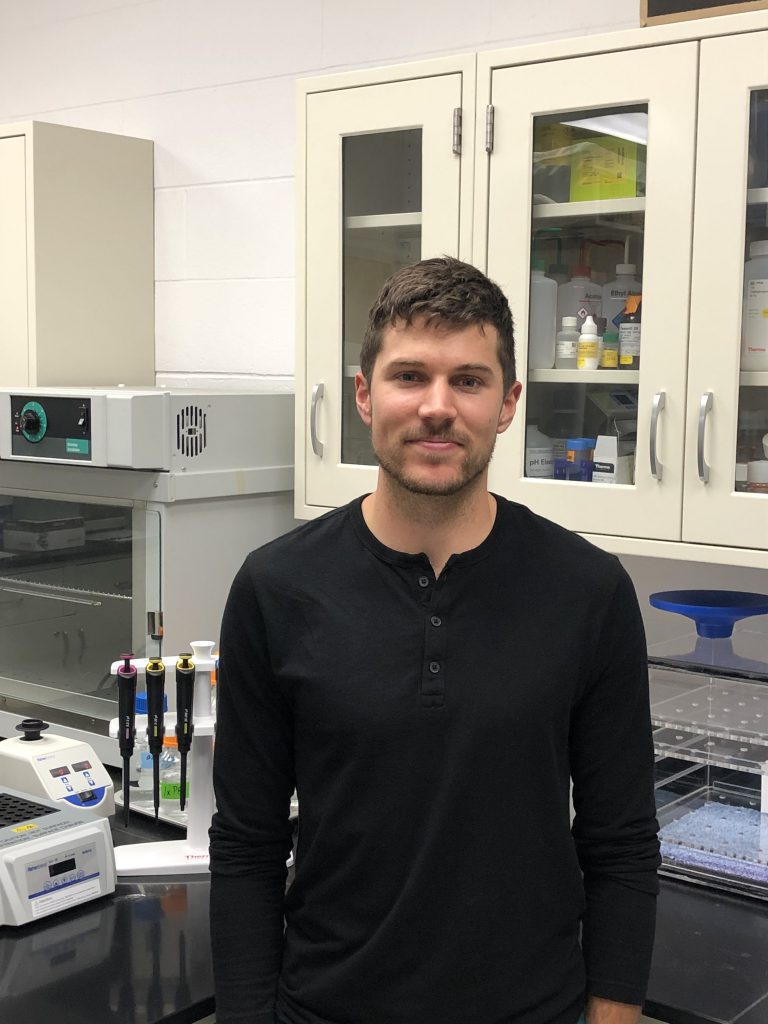The School of Kinesiology, housed in the College of Education and Human Development, is home to 14 different labs and centers. Each one has a specific research and/or outreach focus, and regularly engages in studies and produces research journal publications. Graduate students involved in School of Kinesiology programs are active participants in this work, using the lab settings to help shape and complete their research and thesis work.

Daniel Hoffman, a Kinesiology MS student with an emphasis area in exercise physiology, has spent the majority of his graduate education experience working in the Skeletal Muscle Plasticity and Regeneration Lab (SMPRL), directed by Sarah Greising, PhD, a School of Kinesiology assistant professor in exercise physiology. For Hoffman, the time in the lab has been an invaluable experience.
“Near the end of my first semester, I decided to reach out to Dr. Greising to see if I could observe what was going on in her lab,” Hoffman said. “In retrospect, that was the most impactful email I have sent since coming here.”
Hoffman’s interaction with Dr. Greising changed the course of his graduate school career. He spoke highly of the advantages of both her mentorship and the ability to be an active participant in her research.
“Honestly, without the time in the lab, I don’t know how I would even have a thesis idea,” Hoffman said. “I’ve been able to participate in so many things, and see the work done first hand.”
Hoffman is scheduled to present his thesis via Zoom next month. He’s chosen to tackle questions regarding pathologic skeletal muscle fibrosis caused by traumatic injury. Hoffman said his hands-on experience in the lab has not only allowed him to make significant progress on his degree, but it’s also opened his eyes to potential future career opportunities.
“When I first started out I wasn’t really sure what options were going to be available to me after I graduated,” Hoffman said. “I knew I needed more than a BS to stay in this field, but I wasn’t sure where I wanted to go. The skills I’ve learned in the lab can be applied to many different career paths and I feel like I’ve learned so much from that experience alone.”
He noted that even if he chooses to venture outside of academia, there are plenty of career options available to him with his newfound knowledge and skills learned in the lab setting.
Hoffman said one of his favorite things about getting to work regularly in the lab is that he has now been a part of all of the processes he previously only read about.
“The best thing about it is that you get to do every step in the process,” Hoffman said. “Before, I might have read about data collected and then try to implement it into a study. But now, I can run the experiment myself; I’m doing everything from collecting tissue samples to testing them to interpreting the results. There are so many things that can go wrong, so it can be frustrating, but it’s really rewarding when it goes well.”
Hoffman plans to continue on to get his PhD in Kinesiology in the School of Kinesiology, and continue his research work with Dr. Greising. His advice to new students is, “Don’t be shy, and reach out to the faculty members that you’re interested in. They will be open to having conversations with you, and it will help you figure out what kind of research you want to do, which is really important.” This leads to his most important piece of advice for students who are considering a graduate program: “Make sure you’re passionate about your interests. Grad school is a lot of work, but it’s really rewarding if it’s what you want to do.”



